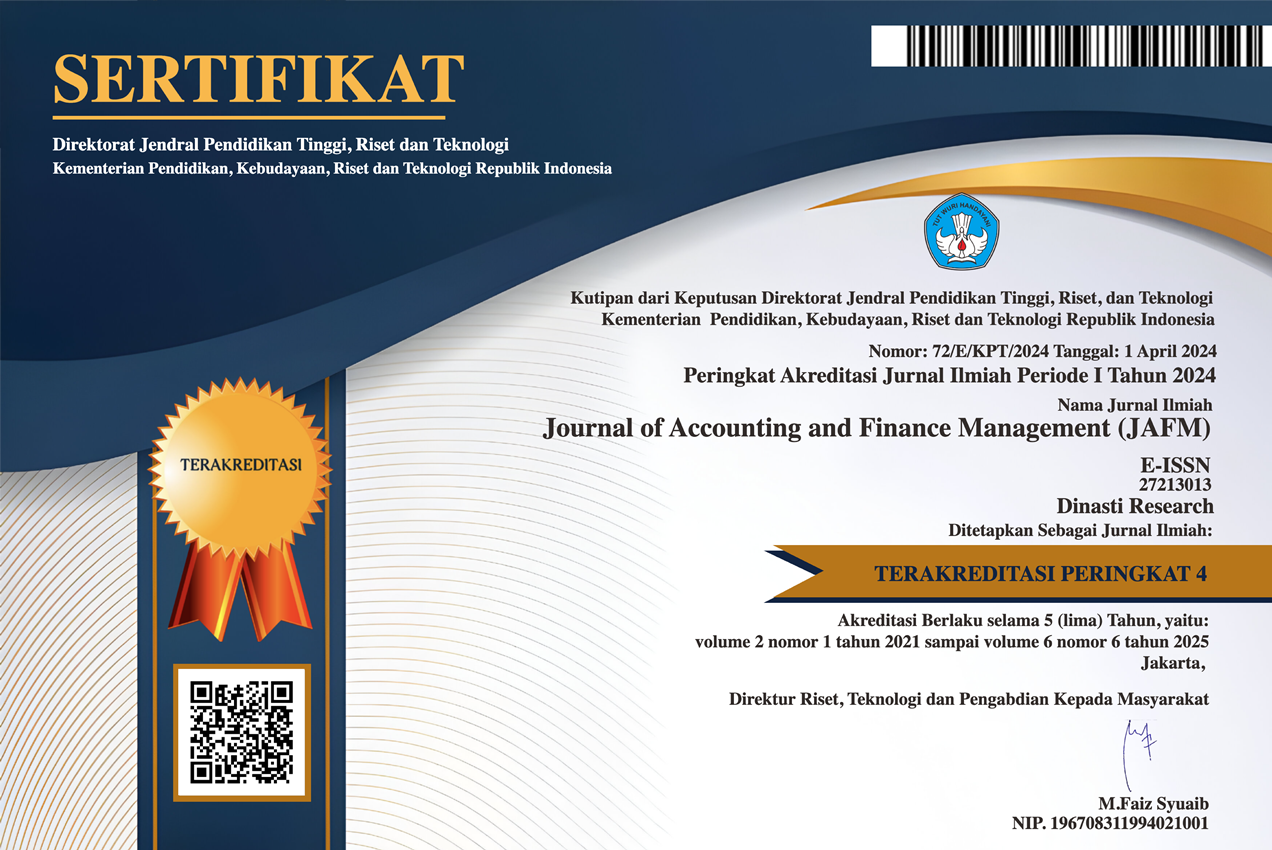Peran Parental Direct Teaching dan Peers and Media Terhadap Financial Behavior Dengan Digital Financial Literacy Sebagai Variabel Moderasi
DOI:
https://doi.org/10.38035/jafm.v6i3.2355Keywords:
Financial Behavior, Digital Financial Literacy, Parental Direct Teaching, Peers and MediaAbstract
Penelitian ini dilakukan dengan tujuan untuk menguji pengaruh dari parental direct teaching dan peers and media terhadap financial behavior baik secara langsung maupun tidak langsung dengan digital financial literacy sebagai variabel mediasi. Jenis penelitian yang digunakan adalah penelitian kuantitatif dengan menggunakan pengujian hipotesis.Variabel penelitian yang digunakan terdiri dari variabel independen yaitu financial socialization dengan dua aspek yaitu parental direct teaching dan peers and media, variabel mediasi digital financial literacy serta variabel dependen financial behavior. Teknik pengambilan sampel menggunakan purposive sampling dengan kriteria responden sudah bekerja minimal 1 tahun serta memiliki akun sosial media dan mobile banking minimal 1. Jumlah sampel yang berhasil dikumpulkan sebanyak 360 responden dan alat analisis yang digunakan adalah Structural Equation Model Partial Least Square (SEM-PLS). Hasil temuan menunjukkan Parental direct teaching dan peers and media terbukti berpengaruh positif terhadap financial behavior; parental direct teaching dan peers and media terbukti berpengaruh positif terhadap digital financial literacy, digital financial literacy terbukti berpengaruh positif terhadap financial behavior dan digital financial literacy terbukti memediasi pengaruh positif dari parental direct teaching dan peers and media terhadap financial behavior.
References
Abdallah, W., Tfaily, F., & Harraf, A. (2025). The impact of digital financial literacy on financial behavior: customers’ perspective. Competitiveness Review?: An International Business Journal, 35(2), 347–370. https://doi.org/10.1108/CR-11-2023-0297
Alhawamdeh, H., Al-Eitan, G. N., Naser Hamdan, M., Ali Mahmoud Al-Hayek, Y., Zraqat, O., Mohammad Alhawamdeh, A., Fuad Hussien, L., Younis Alkhawaldeh, B., & Professor, A. (2023). The Role Of Financial Risk Tolerance And Financial Advisor Management In Mediating The Relationship Between Financial Attitudes, Financial Knowledge, Financial Anxiety, And Sustainable Financial Retirement Planning. Journal of Namibian Studies, 33, 5071–5100. https://orcid.org/0000-0002-2364-1500
Carpena, F., Cole, S., Shapiro, J., & Zia, B. (2019). The ABCs of Financial Education: Experimental Evidence on Attitudes, Behavior, and Cognitive Biases. Management Science, 65(1), 346–369.
Creswell, J. W., & Creswell, J. D. (2018). Research Design?: Qualitative, Quantitative, and Mixed Methods Approaches (Fifth Edition). SAGE Publications, Inc.
Dogra, P., Kaushik, A. K., Kalia, P., & Kaushal, A. (2023). Influence of augmented reality on shopping behavior. Management Decision, 61(7), 2073–2098. https://doi.org/10.1108/MD-02-2022-0136
French, D., McKillop, D., & Stewart, E. (2021). Personal finance apps and low-income households. Strategic Change, 30(4), 367–375. https://doi.org/10.1002/jsc.2430
Goyal, K., Kumar, S., & Hoffmann, A. (2023). The direct and indirect effects of financial socialization and psychological characteristics on young professionals’ personal financial management behavior. International Journal of Bank Marketing, 41(7), 1550–1584. https://doi.org/10.1108/IJBM-09-2022-0419
Hair, J. F., Black, W. C., Babin, B. J., & Anderson, R. E. (2019). Multivariate Data Analysis Eighth Edition. www.cengage.com/highered
Hudaefi, F. A. (2020). How does Islamic fintech promote the SDGs? Qualitative evidence from Indonesia. Qualitative Research in Financial Markets, 12(4), 353–366. https://doi.org/10.1108/QRFM-05-2019-0058
Kumar, P., Pillai, R., Kumar, N., & Tabash, M. I. (2023). The interplay of skills, digital financial literacy, capability, and autonomy in financial decision making and well-being. Borsa Istanbul Review, 23(1), 169–183. https://doi.org/10.1016/j.bir.2022.09.012
Lyons, A. C., & Kass-Hanna, J. (2021). A methodological overview to defining and measuring “digital” financial literacy. Financial Planning Review, 4(2). https://doi.org/10.1002/cfp2.1113
Marchant, C., & Harrison, T. (2020). Emerging adults’ financial capability: A financial socialization perspective. International Journal of Consumer Studies, 44(2), 99–110. https://doi.org/10.1111/ijcs.12548
Meisa, D. R., & Aulia, H. M. (2023). Financial Risk Tolerance And Knowledge Of Financial Planning For Retirement On Retirement Saving Behavior: A Study On Workers In Bandung City, Indonesia. Eurasia: Economics & Business, 8(74), 117–121. https://doi.org/10.18551/econeurasia.2023-08
Pandey, A., & Utkarsh. (2024). Determinants of positive financial behavior: a parallel mediation model. International Journal of Emerging Markets, 19(11), 4073–4093. https://doi.org/10.1108/IJOEM-01-2022-0124
Setiawan, M., Effendi, N., Santoso, T., Dewi, V. I., & Sapulette, M. S. (2022). Digital financial literacy, current behavior of saving and spending and its future foresight. Economics of Innovation and New Technology, 31(4), 320–338. https://doi.org/10.1080/10438599.2020.1799142
Utkarsh, Pandey, A., Ashta, A., Spiegelman, E., & Sutan, A. (2020). Catch them young: Impact of financial socialization, financial literacy and attitude towards money on financial well-being of young adults. International Journal of Consumer Studies, 44(6), 531–541. https://doi.org/10.1111/ijcs.12583
Van Campenhout, G. (2015). Revaluing the role of parents as financial socialization agents in youth financial literacy programs. Journal of Consumer Affairs, 49(1), 186–222. https://doi.org/10.1111/joca.12064
Yahya, M. R., Liestyowati, Majid, J., Nurchayati, & Sri Mulastih, L. (2023). The Influence Of Digital Literacy And Financial Self Efficacy On Risky Credit Behavior In Using Shopee Pay Later. Edunomika, 08(01), 2023.
Zhao, H., & Zhang, L. (2020). Talking money at home: the value of family financial socialization. International Journal of Bank Marketing, 38(7), 1617–1634. https://doi.org/10.1108/IJBM-04-2020-0174
Zulaihati, S., Susanti, S., & Widyastuti, U. (2020). Teachers’ financial literacy: Does it impact on financial behaviour? Management Science Letters, 10(3), 653–658. https://doi.org/10.5267/j.msl.2019.9.014
Downloads
Published
How to Cite
Issue
Section
License
Copyright (c) 2025 Dyah Astarini, Mutia Anindita Denis, Shafrani Dizar

This work is licensed under a Creative Commons Attribution 4.0 International License.
Authors who publish their manuscripts in this journal agree to the following conditions:
- The copyright on each article belongs to the author(s).
- The author acknowledges that the Journal of Accounting and Finance Management (JAFM) has the right to be the first to publish with a Creative Commons Attribution 4.0 International license (Attribution 4.0 International (CC BY 4.0).
- Authors can submit articles separately, arrange for the non-exclusive distribution of manuscripts that have been published in this journal into other versions (e.g., sent to the author's institutional repository, publication into books, etc.), by acknowledging that the manuscript has been published for the first time in the Journal of Accounting and Finance Management (JAFM).



























